Between a white-collar worker with a monthly salary of 6,000 yuan and a courier with a monthly income of nearly 10,000 yuan, which career would you like to choose? The answer depends on how you look at the profession of courier.
At the moment when the e-commerce industry is booming, consumers may not roughly classify couriers as low-income people as they did a few years ago. Even though the average monthly income of many couriers is not as high as 10,000 yuan, the incentive mechanism of getting more for more work does make some people gain a lot. According to the data of Suning Logistics, in 2018, the average monthly income of the company’s couriers in the busy season can reach more than 7,500 yuan, and the highest income can earn 20,000 yuan a month.
The phenomenon that "blue-collar wages far exceed white-collar workers", which really exists in developed countries and once puzzled the people, has appeared around us; Judging from the development trend of the express delivery industry in the Internet economic network, this may become a normal state in the future.
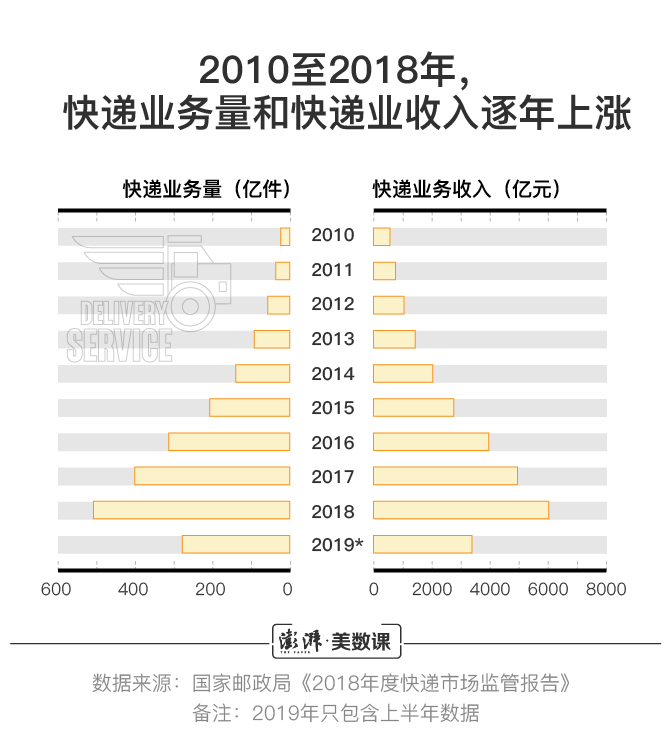
According to the data of the State Post Bureau, in the past nine years, the national express delivery business volume and business income have increased by more than 10 times. According to the latest data released on July 22, in the first half of 2019, the national express delivery business volume and business income reached 27.76 billion pieces and 339.67 billion yuan respectively, up 25.7% and 23.7% year-on-year; This level even exceeds the annual total in 2015.
Hou Enlong, president of Suning.cn, called the couriers in China "the greatest hero behind e-commerce" and set up the first courier festival in 2017, hoping to improve the welfare and social recognition of this profession. This festival is celebrated for the third year, and changes are indeed taking place.
However, people’s professional identity with couriers has not changed as quickly as e-commerce has changed the express delivery industry. When measuring whether a job is good or bad, people will still come up with two yardsticks that are popular in the blind date market — — "Birth" and "potential" — — Make a judgment. Therefore, although couriers are not inferior to white-collar workers in many cities, they still seem to be insufficient to reverse their position in the city.
Consumers recognize the importance of courier, but they are not optimistic about the value of this profession.
Technology companies have promoted the rapid rise of life-oriented service industry and reshaped people’s lives. Nowadays, consumers can enjoy a variety of life services without leaving home, and couriers play an indispensable role in it.
The degree of consumers’ dependence on express delivery service is presented in the 2018 China Express Development Index Report issued by the State Post Bureau. The data shows that in 2018, the per capita express usage in China reached 36 pieces, an increase of 7 pieces over the previous year. The average daily service of express delivery companies is as high as 280 million, which means that one in five people is using express delivery service every day.
From the statistics of consumer complaints against major express delivery companies by the State Post Bureau, in June 2019, the average number of complaints filed by consumers per million express delivery was less than 8 nationwide, and consumers were satisfied with the effective complaint handling of major express delivery companies as high as 96.7%. It is not difficult to draw the conclusion that consumers are satisfied with the courier’s service.
But is recognizing the courier’s service equivalent to recognizing the value of this profession?Few researchers have discussed this problem.
In a research paper retrieved from The Paper, two scholars from China Youth University for Politics and Peking University conducted a questionnaire survey on 180 Beijing consumers in 2017 to understand their professional identity with couriers. The consumers surveyed include students, civil servants, doctors, teachers and company employees.
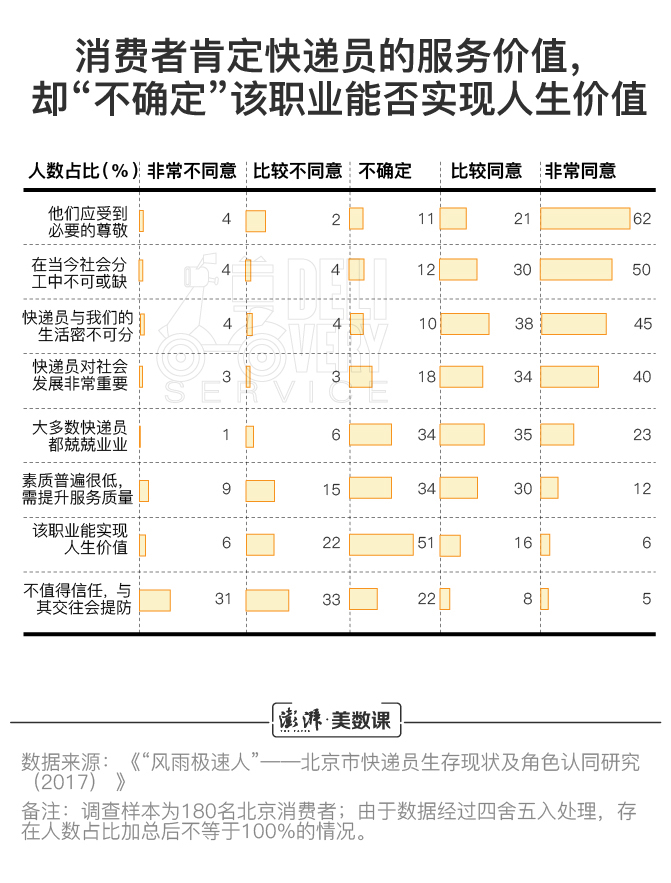
Judging from the survey results, there is a subtle contradiction in the professional evaluation of couriers: on the one hand, most people affirm the contribution of this profession to society, and also recognize the hard work of most couriers; On the other hand, when judging whether this profession can "realize the value of life", people’s attitudes become wavering, and more than half of the respondents chose the ambiguous answer of "uncertainty".
The existence of "double standards" is partly due to consumers’ incomplete understanding of the professional evaluation and development prospects of couriers.
Regardless of the identity of others, couriers have a high sense of professional value.
The hat that was buckled on the head of the previous generation of blue-collar workers is now difficult to completely pass on to the new blue-collar workers in the Internet era.
Many of them are really hard to get rid of some identity labels of the former, such as "rural"; However, they are not completely "low-educated". According to the data of Suning Logistics, the proportion of people with high school, vocational school or technical secondary school education or above is close to 80%, and if they work hard, a large part of them have already bid farewell to "low income".
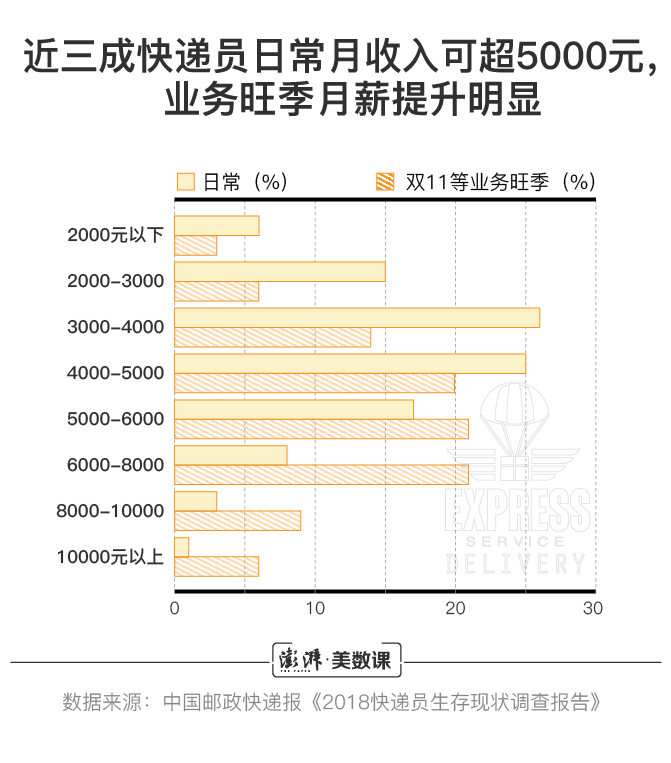
In addition to the e-commerce opportunities and personal income-generating ability that people talk about, couriers have deeper professional demands, but they are rarely listened to.
In 2017, China Federation of Logistics and Purchasing, together with SF Express, Suning Logistics and other enterprises, jointly launched the "China E-commerce Logistics and Express Employees Questionnaire Survey", and received effective responses from 4,363 first-line couriers. When asked why they choose the profession of courier, although the economic return rate is still the most important factor, couriers also value metaphysical needs such as "team atmosphere" and "professional sense".
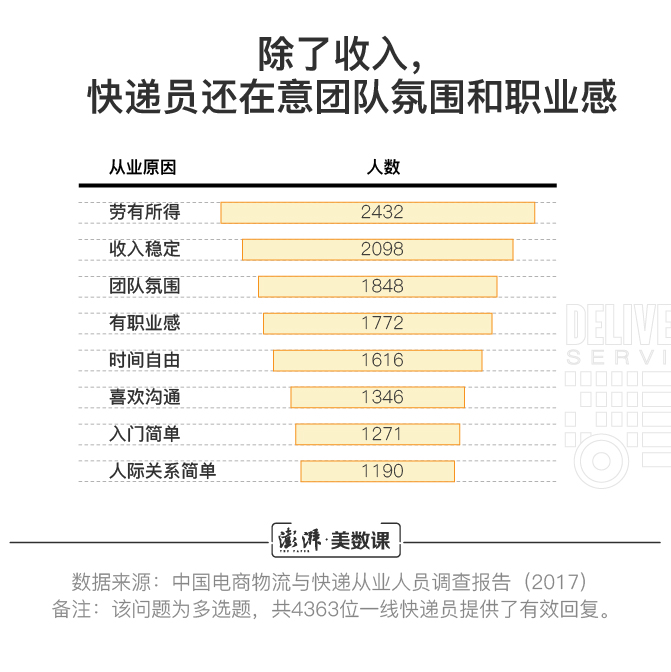
Most interviewees don’t regard their occupation as a low-status type of work that repeatedly performs simple labor, but think that it needs "responsibility and responsibility" as well as "diligence and wisdom".
Courier work is not simple, but also a cutting-edge technology testing ground.
High-end words popular in the Internet technology world, such as cloud computing and storage, robotics and automation, wearable mobile technology, 3D printing technology, driverless cars and drones, have already penetrated into the logistics industry and optimized the work content of couriers.
Under the operation of the instant response mode of "APP+ pre-warehouse", Suning Logistics can realize the minute-level distribution that was unimaginable in the past. The goods in Suning Store can be delivered to users within 3 kilometers within 30 minutes after the user places an order, the warehouse keeper selects the goods, and the courier immediately scans the code to pick up the goods and distributes the goods.
Liu Shidan is an instant delivery courier of Suning in Guangzhong Road, Hongkou District, Shanghai. Compared with the traditional courier, his work content is much more efficient because of the assistance of "Seconda" APP and the cooperation of front warehouse management personnel: "The workflow is simplified and there will be no mistakes in picking up goods."
It has been nearly two years since the efficient service of "instant matching" was realized. The role of couriers has also changed in the process of service upgrading. In addition to being "fast", they have to achieve "accuracy". In order to provide consumers with all-round services, they need to master the business of returning goods, sending and loading, packaging and recycling in addition to the simple task of sending parts.
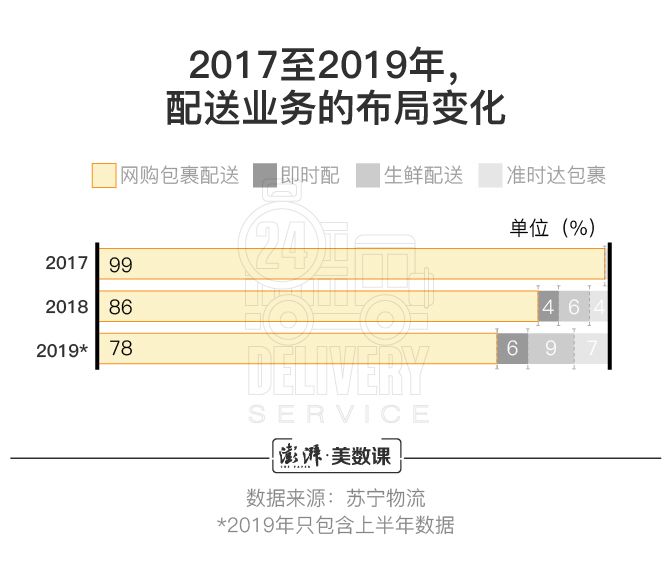
Yang Deshun, who has worked in Suning Logistics Chongqing Station for five years, has his own observation on the development of the logistics industry. He believes that the development of the logistics industry needs to combine the service needs of consumers in the Internet era and develop new service products like "on time" and "instant delivery", and the development of new business will also require corresponding logistics talents.
Yang Deshun worked in the front line of express delivery station for one year. Because of his excellent work, he was promoted from the express delivery stationmaster to the logistics center to be responsible for data tracking, and now he has become the operation manager of the network planning department of the express delivery operation center in Chongqing. While working in the logistics center, Yang Deshun found that the traditional warehouse inventory process was inefficient, cumbersome and not environmentally friendly — — All the goods and positions are printed on A4 paper, and the staff check the goods one by one with paper documents. Once the data are not matched, they may have to start over and check the model and quantity of the goods again.
In order to improve work efficiency, without a programming foundation, he spent two months teaching himself PHP programming language, and finally developed a mobile phone warehouse inventory system. The warehouse staff only need to hold the mobile phone, input the data into the system, and finally export the data and compare it with the original data stored in Suning logistics system, so as to complete the inventory of goods.
Like Yang Deshun, many couriers in the torrent of technological change have realized that they need to master more skills if they want to have a longer-term career development.
In the Survey Report of E-commerce Logistics and Express Practitioners in China released by China Federation of Logistics and Purchasing in 2017, the couriers affirmed the current enterprise training, but at the same time conveyed their strong desire to increase the training of enterprises, and hoped to get many learning and training opportunities such as "professional skills", "management ability" and "business development".
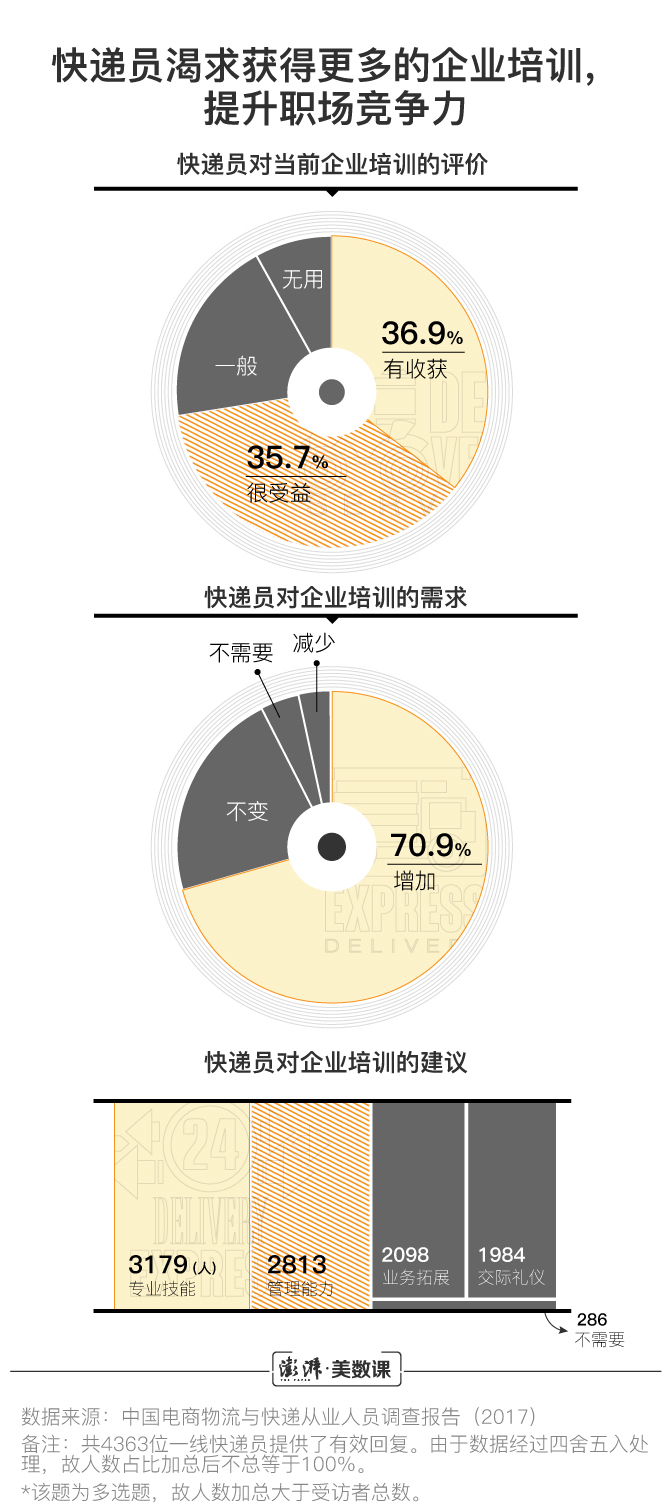
Taking the most valued "professional skills" as an example, in recent years, various types of vocational skills competitions have been held all over the country, and couriers have shown their talents in professional skills such as receiving and sending express mail, delivering express mail, receiving express mail and sorting express mail.
On August 6, 2019, the State Post Bureau and the Ministry of Human Resources and Social Security jointly issued the Notice on Strengthening Vocational Skills Training for Express Delivery Employees, proposing to increase policy support, carry out vocational skills training for express delivery employees on a large scale, and improve the quality of express delivery skilled personnel.
Courier Career 2.0: How many versions are there possible?
A foreseeable future is that in the face of the reality that manual services are becoming more and more expensive, the income level of couriers is likely to further increase.They hope to complete the primitive accumulation of individual capital through hard work like the blue-collar workers in the west, and eventually become "blue-collar middle class" with the same social status as white-collar workers.The express point partner system promoted by SF Express and Suning Logistics may accelerate the formation of "blue-collar middle class" in the process of promoting the transformation of couriers into entrepreneurs.
When the development of technology further promotes the improvement of distribution efficiency,The express delivery industry may also embrace the "odd job economy" like other service industries.The task of delivery and express delivery can rely on the information distribution and process management of internet technology, and be distributed to all part-time couriers in a crowdsourcing way; Just like private car owners who start hitchhiking business, people who are interested in courier work can participate in this job, while full-time couriers in the past can spend their time more freely and pursue more life possibilities while continuing to engage in courier industry.
If the unmanned distribution technology is further improved, couriers have the potential to become monitors of intelligent distribution systems., responsible for analyzing data, reporting and handling distribution anomalies. At present, these positions have begun to emerge. Liu Shidan, an instant delivery courier, said that if he performs well and intends to change jobs, he and his colleagues will hopefully be responsible for the monitoring of the instant delivery system, moving from the front line to the background, and paying attention to the dynamics of delivery personnel at the monitoring desk.
No matter which future comes earlier, the professional value of couriers will far exceed what we set for them today.
关于作者